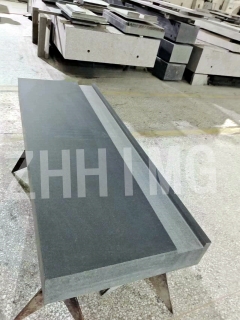Granite precision platforms have been used in various industries for a long time. They are known for their incredible durability, high-level accuracy and excellent stability. Granite itself is made of natural stone, which makes it a popular material for precision surfaces. However, granite precision platforms come with their own set of advantages and disadvantages. In this article, we will discuss both the advantages and disadvantages of granite precision platforms.
Advantages of Granite Precision Platform
1. Durability - Granite is a natural stone that is extremely durable and long-lasting. The hardness and density of granite make it resistant to wear, abrasions, and corrosion, which makes it an ideal material for use in precision platforms.
2. Accuracy - Granite precision platforms offer high-level accuracy because of their stability and rigidity. The surface of granite is less likely to warp or bend, providing a stable base for the measurement and inspection tools, resulting in more accurate results.
3. Stability - Granite is a dense material with a low coefficient of thermal expansion. This means it is less likely to expand, contract or warp when exposed to temperature fluctuations, which provides exceptional stability for measuring devices.
4. Resistance to Wear and Tear - The hardness of granite makes it resistant to wear from repeated use, reducing the need for maintenance costs.
5. Aesthetic Appeal - Granite precision platforms have an attractive appearance that adds to the overall aesthetics of the facility. This enhances the visual appeal of the platform and provides an excellent backdrop to showcase the high-quality measurement instruments.
Disadvantages of Granite Precision Platform
1. Heavy - The weight of granite platforms can be a significant disadvantage. The heavyweight of granite platforms can make their installation difficult, requiring additional infrastructure and resources to support it in their installation.
2. Cost - Granite is an expensive material, and the cost of granite precision platforms is significantly higher than other materials. The high cost makes it less accessible for small and medium-sized businesses.
3. Limited Customization - Granite precision platforms are typically mass-produced, limiting the extent of customization to accommodate specific requirements.
4. Prone to Breakage - Granite is breakable when subjected to extreme pressure, making it less favorable for impact or forceful applications. It is also a brittle material that can break or chip if dropped, making it less suitable for field applications.
5. Time-consuming - Precise Cutting, shaping, and finishing of granite platforms is a time-consuming process. This increases the production time, delaying delivery schedules in case of urgent requirements.
Conclusion
In conclusion, granite precision platforms have their share of advantages and disadvantages. However, the advantages such as durability, accuracy, stability, resistance to wear and tear, and aesthetic appeal make it preferred in various applications, including scientific, medical, or production industries. The disadvantages like heavyweight, cost, limited customization, prone to breakage, and time-consuming make it less viable for some applications. Therefore, selecting a granite precision platform is a matter of carefully evaluating the needs of the application to determine whether the advantages outweigh the disadvantages or vice versa.
Post time: Jan-29-2024

